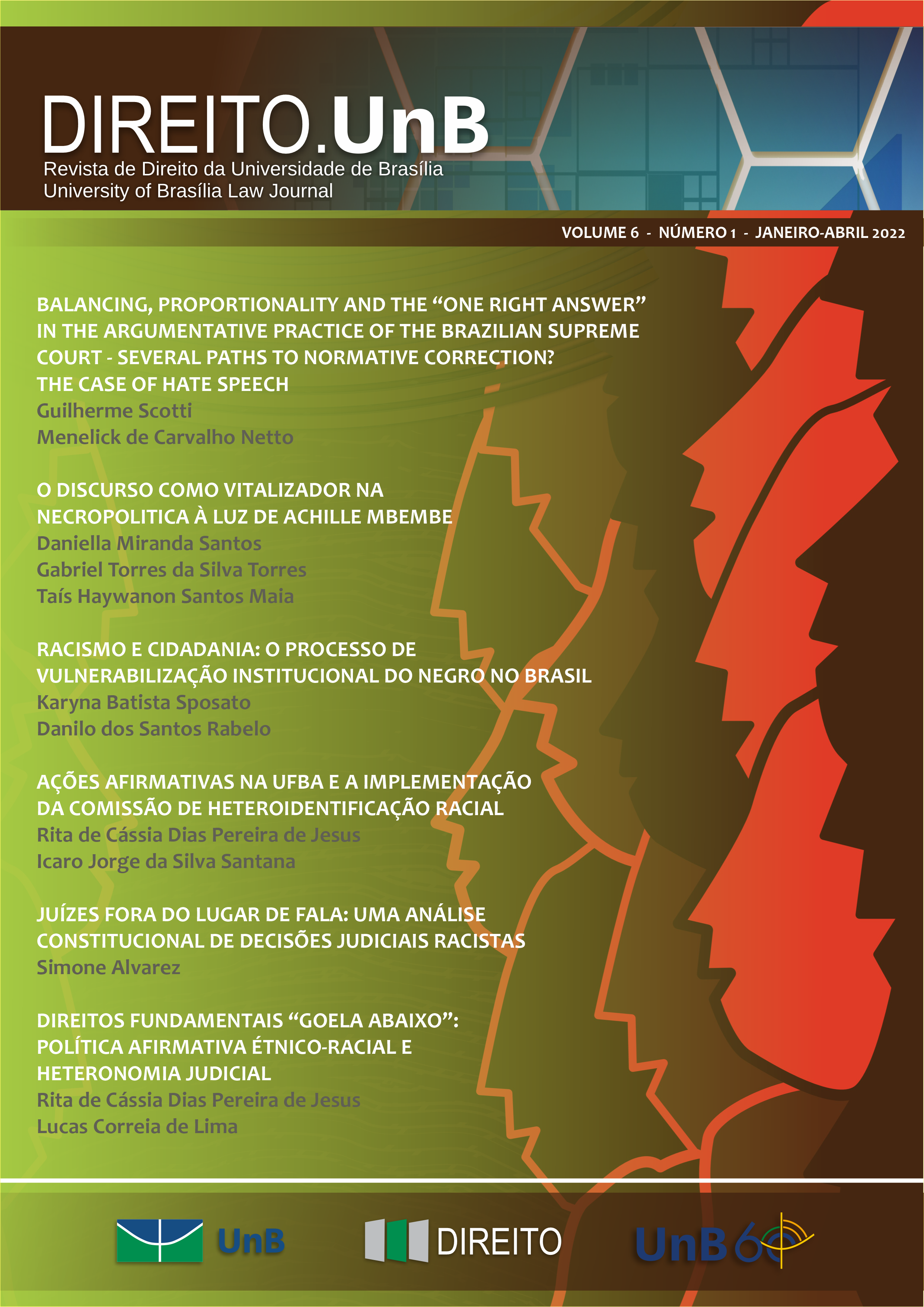JUÍZES FORA DO LUGAR DE FALA: UMA ANÁLISE CONSTITUCIONAL DE DECISÕES JUDICIAIS RACISTAS
Keywords:
Racismo; lugar de fala; determinismo biológico; sentenças judiciais; Conselho Nacional de Justiça.Abstract
Brazil is a country in which the existence of racism is recognized, however, very few are those who declare themselves racist. On the other hand, there are white judges, who deny themselves racists, but feel comfortable talking about blackness and racism, reaching the apex of basing judicial sentences on biological determinism, an institute used in the scope of Anthropology and rejected by it. Two judicial decisions were highlighted: the one given in Paraná, in which the accused was considered to belong to the criminal group for being black, and the one given in Campinas, in which it was concluded that the white accused did not have the stereotype of a criminal. As worrying as these decisions is to verify that the National Council of Justice has never sanctioned any judge for racism, which leads to the conclusion that, probably, there is underreporting of racism in judicial decisions precisely because of the mistrust in the body which, according to art. 103-B, §4, III of the Federal Constitution has the competence to receive and hear complaints against organs of the Judiciary and to initiate ongoing disciplinary proceedings. It is essential to reflect and warn that the National Council of Justice cannot be a sham of protection, when, in fact, it may be acting according to Brazilian racism and acting contrary to what the current Constitution preaches: the fight against racism.
Downloads
References
ADESKY, Jacques d`. Racismos e antirracismos no Brasil. Rio de Janeiro: Pallas, 2009.
ANDRADE, Francisco Leal de. Determinismo biológico e questões de gênero no ensino de Biologia: representações e práticas do docente no Ensino Médio. Dissertação de Mestrado apresentado ao Programa de Pós-Graduação em Ensino, Filosofia e História das Ciências, da Universidade Federal da Bahia, 2011, p. 259.
ARAÚJO, Murilo. O “lugar de fala” ameaça a liberdade de expressão? 29 de junho de 2016. Disponível em: https://dissenso.org/o-lugar-de-fala-ameaca-a-liberdade-de-expressao/. Acesso em 14 de fevereiro de 2021.
ASSIS, Olney Queiroz; KÜMPEL, Vitor Frederico. Manual de Antropologia Jurídica. São Paulo: Saraiva, 2016.
BORGES, Edson; MEDEIROS, Carlos Alberto; ADESKY, Jacques d`. Racismo, preconceito e intolerância. São Paulo: Atual, 2002.
CARVALHO, Igor. Em dez anos, nenhum juiz foi punido por racismo em processos abertos no CNJ. 2020. Disponível em: https://www.brasildefato.com.br/2020/09/25/em-dez-anos-nenhum-juiz-foi-punido-por-racismo-em-processos-abertos-no-cnj. Acesso em: 12 de fevereiro de 2021.
CHAUÃ, Marilena. Convite à Filosofia. 12 ed. São Paulo: Saraiva, 2002.
CONGRESSO EM FOCO. Mourão diz que país herdou “indolência” do índio e “malandragem” do negro. 06 de agosto de 2018. Disponível em: https://congressoemfoco.uol.com.br/eleicoes/mourao-diz-que-pais-herdou-indolencia-do-indio-e-malandragem-do-negro/. Acesso em: 12 de fevereiro de 2021.
CONSELHO NACIONAL DE JUSTIÇA. Ouvidoria CNJ. Disponível em: https://www.cnj.jus.br/ouvidoria-cnj/como-acionar-o-cnj/. Acesso em: 12 de fevereiro de 2021.
FREIRE, Paulo. Pedagogia do Oprimido. 71. Ed. Rio de Janeiro: Paz e Terra, 2019.
FREITAS, Ana Luíza Policani. Juíza de Campinas diz que réu não parece bandido por ser branco. Disponível em: https://analuizapolicani.jusbrasil.com.br/noticias/681589235/juiza-de-campinas-diz-que-reu-nao-parece-bandido-por-ser-branco. Acesso em: 10 de fevereiro de 2021.
GIOVANAZ, Daniel. Juíza diz em sentença que homem é negro em razão de sua raça. Disponível em: https://www.brasildefato.com.br/2020/08/12/exclusivo-juiza-diz-em-sentenca-que-homem-negro-e-criminoso-em-razao-da-sua-raca. Acesso em: 09 de fevereiro de 202a.
KILOMBA, Grada. Plantation Memories: episodes of Everyday Racism. Münster: Unrast Verlag, 2012. Disponível em: https://goo.gl/w3ZbQh. Acesso em: 14 de fevereiro de 2021.
LEWONTIN, Richard C. Biologia como ideologia: a doutrina do DNA. Tradução de F. A. Moura Duarte, Francine Muniz e José Tadeu de Sales. Ribeirão Preto: FUNPEC-RP, 2000.
MENDES, Gilmar Ferreira; BRANCO, Paulo Gustavo Gonet. Curso de Direito Constitucional. São Paulo: Saraiva, 2018.
RAMOS, André de Carvalho. Curso de Direitos Humanos. 6. Ed. São Paulo: Saraiva, 2019.
RIBEIRO, Djamila. Lugar de fala. São Paulo: Sueli Carneiro, 2020.
_______. Pequeno Manual Antirracista. São Paulo: Companhia das Letras, 2019.
_______. Quem tem medo do feminismo negro? São Paulo: Companhia das letras, 2018.

Downloads
Published
How to Cite
Issue
Section
License
Copyright (c) 2022 Direito.UnB - Law Journal of the University of Brasília

This work is licensed under a Creative Commons Attribution-NonCommercial-NoDerivatives 4.0 International License.
Autores que publicam na Revista Direito.UnB concordam com os seguintes termos:
- Autores mantêm os direitos autorais e concedem à revista o direito de primeira publicação, com o trabalho simultaneamente licenciado sob a Licença Creative Commons - Atribuição-NãoComercial-SemDerivações 4.0 Internacional que permite o compartilhamento do trabalho com reconhecimento da autoria e publicação inicial nesta revista.
- Autores têm autorização para assumir contratos adicionais separadamente, para distribuição não-exclusiva da versão do trabalho publicada na Revista Direito.UnB (ex.: publicar em repositório institucional ou como capítulo de livro), com reconhecimento de autoria e publicação inicial nesta revista.
- Autores têm permissão e são incentivados a publicar e distribuir seu trabalho online (ex.: em repositórios institucionais ou em suas páginas pessoais) a qualquer momento após à definição do processo editorial.
- Autores concordam que, eventualmente, seus trabalhos poderão ser agregados pela Revista Direito.UnB às bases e sistemas de informação científica existentes (indexadores e bancos de dados atuais) ou que existam no futuro (indexadores e bancos de dados futuros). Os detentores dessas bases de dados terão a possibilidade de realizar as seguintes ações sobre o artigo:
- Reproduzir, transmitir e distribuir o artigo, no todo ou em parte sob qualquer forma ou meio de transmissão eletrônica existente ou desenvolvida no futuro, incluindo a transmissão eletrônica para fins de pesquisa, visualização e impressão;
- Reproduzir e distribuir, no todo ou em parte, o artigo na impressão;
- Capacidade de traduzir certas partes do artigo;
- Extrair figuras, tabelas, ilustrações e outros objetos gráficos e capturar metadados, legendas e artigo relacionado para fins de pesquisa, visualização e impressão;
- Transmissão, distribuição e reprodução por agentes ou autorizada pelos proprietários de distribuidoras de bases de dados;
- A preparação de citações bibliográficas, sumários e índices e referências de captura relacionados de partes selecionadas do artigo;
- Digitalizar e/ou armazenar imagens e texto de artigo eletrônico.





